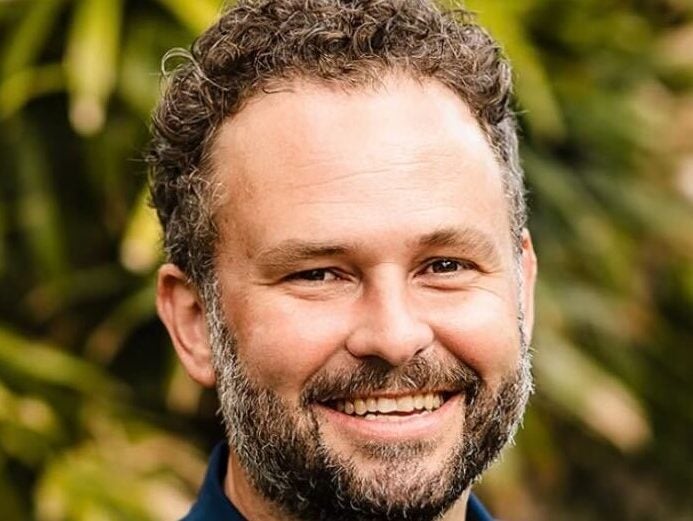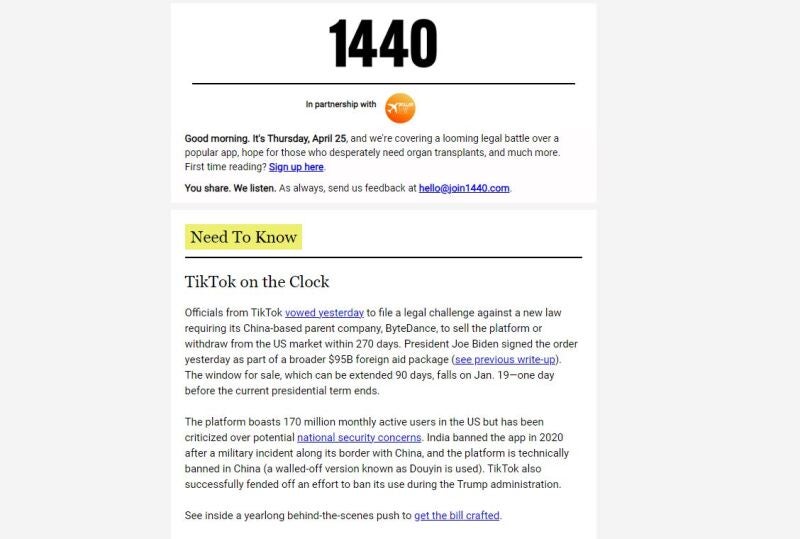
1440 may be the biggest media brand you’ve never heard of. It has an email subscriber list of 3.5 million, and it is growing at a rate of 250,000 new readers per month, mainly in the US, according to Tim Huelskamp, the CEO.
Written in-house, its Daily Digest email aims to tell you everything you need to know by selecting the most important stories of the day, summarising them and linking through to publisher sources.
The business is funded entirely through native advertising placements and sponsorship slots on the email. 1440 only collects readers’ email addresses and it publishes just one daily edition.
1440 is part of the new breed of politically nonpartisan American news brands — others include Semafor, The Free Press, Axios and The Messenger (now defunct) — gaining readers in a market dominated by newsrooms that overtly lean left or right. Its slogan is “All your news. None of the bias.”
Its business model relies on paying to acquire new readers and then selling ads against those eyeballs, in a finely tuned system of content-enhanced arbitrage. The model only works because 1440’s staff focus relentlessly on what readers actually want and are under daily pressure to deliver fascinating content. If readers become bored, the business model unravels.
Advertising to attract new readers isn’t a new or unique practice, but 1440 has taken the model to an extreme. The company runs ads on all the main social media channels, encouraging people to subscribe to its daily news summary. Its average cost-per-acquisition starts at around $3 per reader, Huelskamp says. At a pace of a quarter of a million new signups per month that would imply a monthly marketing budget of the better part of $1m.
And it works, Huelskamp says: “We do over a million [dollars] in revenue per employee.” The company has 15 employees — which implies a run-rate in excess of $15m annually.
There’s a certain brutality to the email business, however.
It’s heavily dependent on having high open rates and high subscriber retention. For every 100 new readers who sign up, Huelskamp says 20 readers can typically be written off immediately — maybe there was a typo in their address or the 1440 message went to their spam folder.
The remaining 80 will stick with the brand for four months or so, but with some attrition, either because they unsubscribe or because 1440 scrubs the list of inactive readers. The remaining 50 readers tend to stay with 1440 for years, he says.
The headwinds don’t end there.
Advertisers only pay 1440 if the email is actually read — so the open rate has to be high to ensure the ad revenue is greater than the cost of acquiring the reader. Huelskamp says 1440 aims for an open rate of 60% daily, or better.
“When someone opens an email, we make about a nickel. So, you know, we send 25 emails a month-ish. We have the highest open-rate in the space, 60%. So they’re opening 15 emails a month. At five cents, [that adds up to] 70-ish cents per user per month.”
“I would say we’re taking more of a private equity approach,” Huelskamp says, “like a unit economics business” with “recurring revenue”.
How 1440 became ‘the fifth largest news email in the world’
Huelskamp’s background is not in news or media — he’s a finance guy from the private equity world. He spent ten years at the $20bn American Capital fund where he turned around faltering companies.
It was sometimes unglamorous work. One of his operational assignments was Jones Stephens, an Alabama-based plumbing supplies company. “You know, like little pipes and stuff like that. They’re supplying Home Depot and also the smaller ones as well. [Places where a] plumber might go in and grab stuff before they go out to the job.”
American Capital also financed the acquisition of VRBO.com, the vacation rental marketplace, by Home Away, and also worked on the sale of a group of niche dating sites to Match.com.
“A lot of the principles that we take here at 1440, which is like, what are the unit economics? What’s your lifetime value? What’s your cost per acquisition? How do you keep the company lean and mean? How do you focus and only invest in things that are profitable and have big TAMs [total addressable markets] to go after? I think a lot of the strategies we take, financially and operationally, came from that experience,” he says.
The company launched in 2017 and is currently the fifth largest news email in the world according to Paved, the email marketing platform, nipping at the heels of Morning Brew, with four million susbcribers. Dribble Insider (a creative design email) and Daily Skimm (female-focused news) are in third and second place, respectively. The number one spot belongs to The Morning, from The New York Times, which has 17 million subscribers.
The name 1440 refers to the year the first printing press was invented and also the exact number of minutes in a day. And the content is almost entirely aggregated from other news sources.
Aggregation was a hot trend about 15 years ago, but in the last couple of years Google and Facebook stopped prioritising traffic to free news sites, making reblogging less sustainable. The Messenger learned that the hard way when it closed after less than a year in January.
1440 is bucking the trend here too. Each edition has about 40 links. A recent one featured the impeachment of Homeland Security Secretary Alejandro Mayorkas, a fire that destroyed Denmark’s 17th Century stock exchange, ABBA being added to the Library of Congress’s music collection, and a new species of ant named after “Voldemort”. Around 95% of 1440’s readers are based in the US.

The idea is it can be helpful for curious, busy professionals who want to know what’s going on outside, say, just the orbit of The New York Times.
Huelskamp and his cofounder, editor-in-chief Andrew Steigerwald, realised that if a person wants to be intellectually “well-rounded”, they’d have to read 15 or 20 different news sites a day. “To have that information every morning, it just took us way too long.”
A reader can get through 1440’s summary in five minutes.
“We built the product for us and we think there’s 50 to 100 million people like us.”
“Like us” is a relative term — one-third of 1440’s readers have graduate degrees, Huelskamp says.
“I’m willing to bet on – I believe in the product. So I’m willing to acquire a user for three dollars to let that flywheel spin.”
Email pged@pressgazette.co.uk to point out mistakes, provide story tips or send in a letter for publication on our "Letters Page" blog
